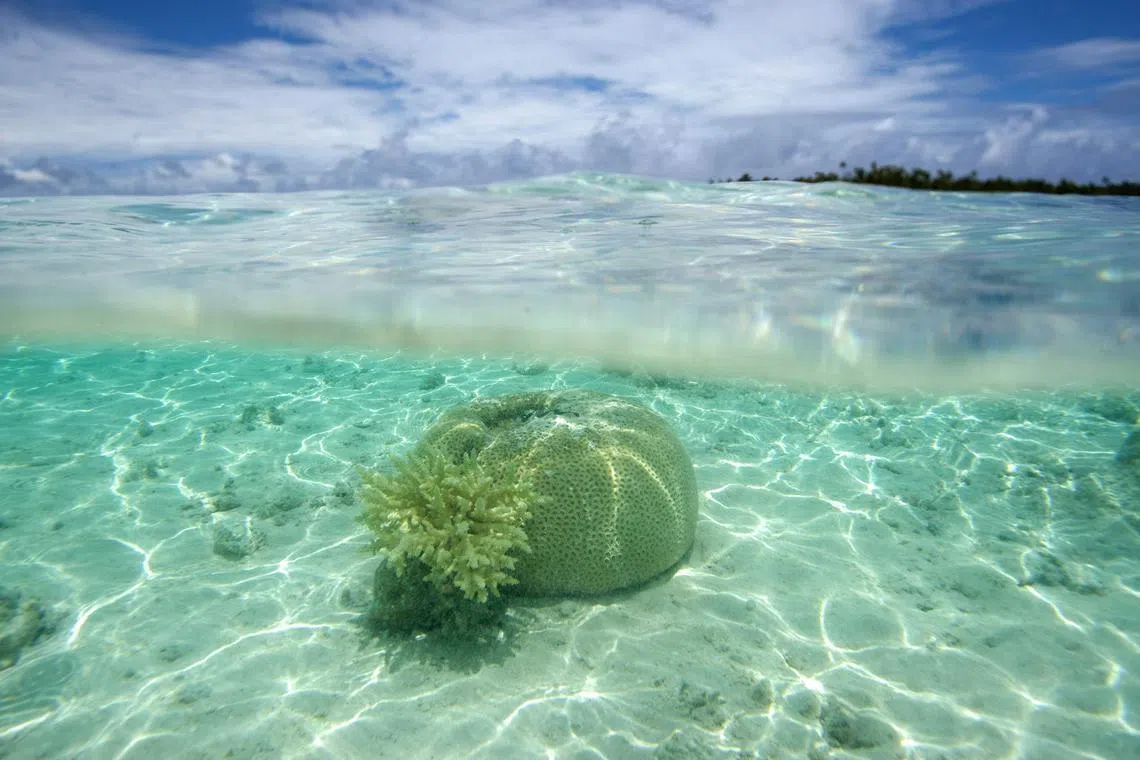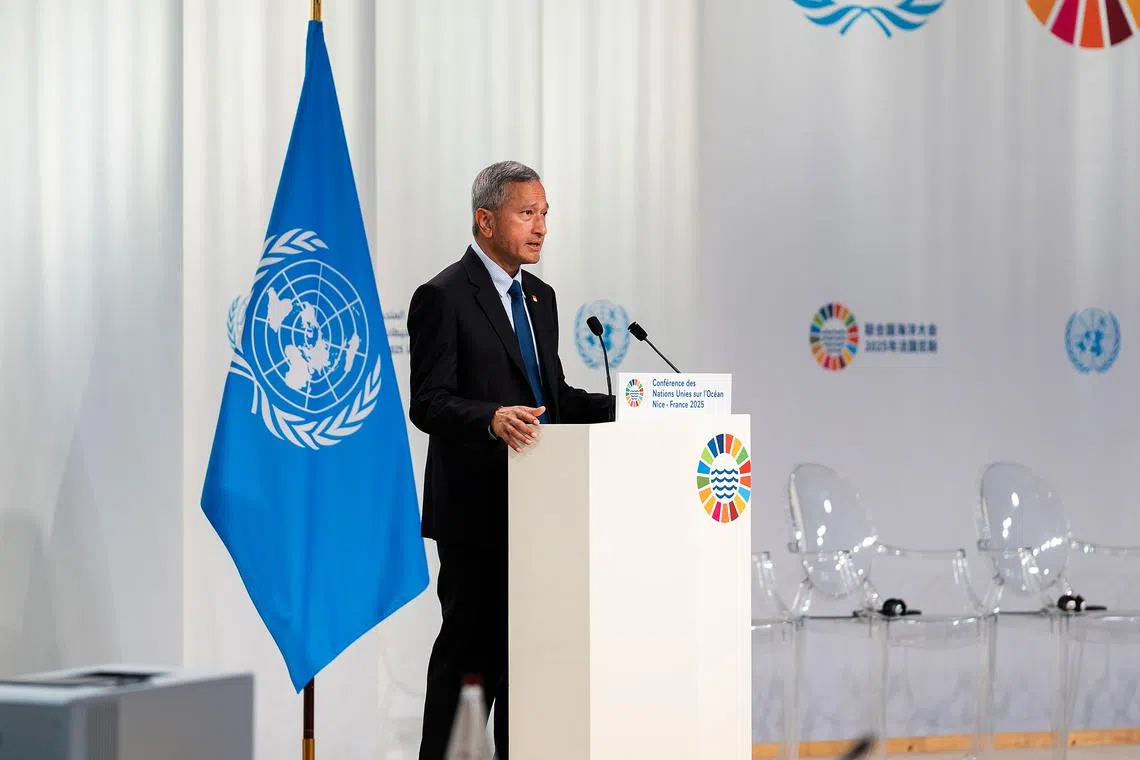Small island states should lead, not just participate, in ocean-related scientific research: Vivian
Sign up now: Get ST's newsletters delivered to your inbox

Small island states, including Singapore, collectively lead just 0.3 per cent of UN-endorsed decade of action projects on ocean health.
PHOTO: AFP
Follow topic:
NICE, France – Small island developing states have been the subjects of ocean research for too long, and should start to lead – not just participate in – scientific research that would help them better understand the marine environments they depend on.
Though they are the custodians of 30 per cent of the ocean under national jurisdictions, small island states lead just 0.3 per cent of UN-endorsed decade of action projects on ocean health, said Singapore’s Foreign Minister Vivian Balakrishnan on June 9. Ocean decade actions are science-based programmes, projects or activities endorsed by the UN to improve ocean health.
“Small island developing states have been the subjects of ocean research for too long, the observation points in data sets, the case studies in reports, and the vulnerable communities in impact assessments,” Dr Balakrishnan said on the first day of the UN Ocean Conference
“Small island states are rarely the lead researchers, rarely the owners of our own ocean data. We believe that it is time to change that narrative,” he added.
A large part of the summit, which ends on June 13, focuses on boosting support for the conservation and sustainable use of oceans, seas and marine resources. Representatives from 193 countries are expected to attend.
Dr Balakrishnan, who is leading a Singapore delegation, was speaking on behalf of the Alliance of Small Island States (Aosis) on the need for scientific cooperation for ocean health. Aosis groups 39 small-island and low-lying coastal developing states including Singapore, Palau, the Maldives and Belize.
Ocean-related scientific research tends to be dominated by Western scientific institutions and groups, which have access to large oceanographic research vessels and instruments that can withstand the inhospitable conditions of the deep sea. Tropical marine habitats like coral reefs are also well studied by scientists from other parts of the world.
However, the High Seas Treaty adopted in 2023 made it clear that such research would benefit from being more collaborative, calling on countries to provide “opportunities for scientists of all states, in particular scientists from developing states, to be involved in or associated with the project”.
The treaty is a historic agreement that lays the groundwork for international collaboration to protect oceanic areas outside national jurisdictions.
Dr Balakrishnan said: “Ocean science is not an academic luxury. Instead, it is an existential necessity for all of us small island states. The well-being of our communities, cultures, ecosystems, food security and livelihoods are dependent on a healthy and thriving ocean.”

Foreign Minister Vivian Balakrishnan delivers a speech at the Third United Nations Ocean Conference in Nice, France, on June 10.
PHOTO: MFA
The ocean is also a treasure trove of information yet unknown, with unique organisms offering scientists the chance to obtain valuable scientific data that can improve life on land. A glow-in-the-dark jellyfish, for instance, inspired the development of a fluorescent dye that enabled doctors to track the movement of cancer cells.
Dr Balakrishnan said Aosis member states are calling for more capacity-building initiatives based on their needs, and the need to include traditional and indigenous knowledge into global frameworks from the outset.
Aosis is calling for a “fundamental rebalancing of ocean science leadership”, he said. “We need dedicated funding mechanisms and institutional support to ensure small island developing states’ research institutions can lead initiatives that address our specific challenges.”
Singapore has a thriving marine research community, with a national facility – the St John’s Island National Marine Laboratory – and a research institute focusing on marine science, the Tropical Marine Science Institute at NUS.
Researchers from these institutions, the National Parks Board (NParks) and NTU’s Asian School of the Environment and Earth Observatory of Singapore are active in initiating and conducting a range of studies of the marine environment.
These include research on marine creatures such as reef fish and giant clams, as well as in coral reefs, seagrass meadows and other marine ecosystems. Underwater robotics, maritime research, and studies on oceanographic parameters like waves are also done in Singapore.
The focus on the need for a strong scientific basis in ocean policy was further underpinned by an event held ahead of the UN Ocean Conference that served as the scientific foundation of the summit.
The One Ocean Science Congress, held in Nice from June 3 to 6, was attended by Dr Karenne Tun, group director of the National Biodiversity Centre at NParks.
She told The Straits Times that the congress offered NParks, Singapore’s lead agency for marine conservation, the opportunity to both learn and contribute to the global scientific community.
“As a small island city-state, Singapore is surrounded by coastal and marine areas that are vital not only to our own environment, but also integral to the broader South-east Asian region,” she said.
Singapore’s waters are home to some 250 hard coral species and about 700 marine fish species. Studies have also shown that hawksbill turtles migrate between Singapore and Malaysia.
Dr Tun said: “Our investment in multi- and transdisciplinary research – for example, in the areas of taxonomy (the science of classification), environmental monitoring, habitat restoration, nature-based solutions and climate change impact science – can contribute to finding solutions beyond our shores.”
Dr Tun said Singapore adopts a science-based approach to marine conservation and management, pointing to the Marine Conservation Action Plan, which sets out strategies to protect, restore and enhance Singapore’s coastal and marine habitats.
NParks regularly reviews this plan to incorporate new knowledge and emerging technologies.
She added: “Through multilateral platforms such as the One Ocean Science Congress, Singapore can leverage scientific research outcomes generated by the global research community to complement local research efforts to guide the conservation and management of our blue spaces, while sharing our knowledge with others at the same time.”
Audrey Tan is an assistant news editor overseeing sustainability coverage. She has reported on the environment for more than a decade and hosts the Green Pulse podcast series.


